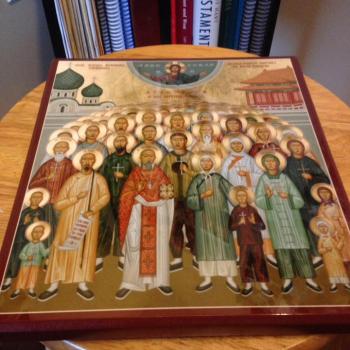#TPCIU just got real.
After following all the drama unfolding around Mars Hill Church on plagiarism, the New York Times/ResultSource debacle, and the growing protest of former pastors and members about church policy and the 2005-6 dismissal of Paul Petry, Bent Meyer, and Lief Moi, we have an anticipated lawsuit (h/t Warren Throckmorton).
Note well: this lawsuit is anticipated. It has not yet been filed.
But it looks like it will be. In light of lawyer Brian Fahling’s letter to Mars Hill Church for document preservation, it looks like things are moving along. You can get all the analysis from WORLD Magazine and Warren Throckmorton.
I’ve got more analysis here. I’ve got a question that I don’t think anyone else has asked yet: what kind of case will this be?
This looks like a pretty big deal. The anticipated lawsuit seems like it will engage RICO, the Racketeer Influenced and Corrupt Organizations Act. That’s no small potato. It’s the federal law that was invented to prosecute the Mafia.
What it does is it holds people legally responsible for giving orders for crimes like extortion, murder, etc. This means that, say, if you’re a Mafia boss and you give an order for a hit, you can be held responsible for murder even though you didn’t carry out the hit. In the religion world, this is the same law that’s being bandied about to hold the Roman Catholic hierarchy responsible for moving pedophile priests around and failing to alert civil authorities of child abuse.
Mars Hill Church is anticipating being served a RICO lawsuit. In particular, it looks like the lawsuit will involve the problematic declaration that Real Marriage was a New York Times bestseller, the problems with plagiarism, and the inflicting of emotional distress on former elders and members. It looks like what’s at issue in particular is Mars Hill Church’s private, top-down structure of authority. The point is that the guys on the top used those under them to carry out all of these things.
I have some questions because it seems like New Calvinist theology is getting taken to court. And if so, is this a religious freedom case?
- In light of the Hosanna-Tabor case, could Mars Hill Church defend themselves theologically? Could they say, for example, that according to, say, Wayne Grudem’s Systematic Theology, their plural elder system is theologically derived and so is their understanding of top-down authority (see p. 934-5)? Could they say, in other words, that the authority issues aren’t so much racketeering, but the practice of a theological understanding of church authority?
- In fact, you could make the same argument about church discipline. Instead of ‘inflicting emotional distress,’ could the church say that they were out to ‘maintain the purity and the unity of the church,’ which is a cardinal point in their theology (and Grudem’s)? I’ve said as much about Sovereign Grace Ministries.
- This brings us to the interests of the state. CUNY anthropologist Talal Asad has probably the most relevant analysis of this question still to date in his 2003 book, Formations of the Secular. Asad makes the point that the secular state sees people as having two aspects to their lives: they are both citizens and persons. A citizen is an individual’s public identity: in this role, a citizen contributes to the common life of the state, generally through economic productivity and political participation. This is different from a person, what an individual does within private communities. As a result, the state doesn’t really care about what people do in their private lives; for example, the state couldn’t be bothered with the violence of S&M; sex because that’s private. (I suppose I could be forgiven for that allusion because this is about the author of chapter 9 of Real Marriage. Plagiarized as portions of the book may be, the argument of that chapter seems generally original, although I suppose one could find parts that sound similar to Dr. Alex Comfort’s groundbreaking sex manual, The Joy of Sex.). In any case, the point is that neither does the state care about what you do in your religious life. (Still scarred? Scroll down, scroll down.) But there’s a slight hitch. While what you do in your religious life (and sex life, for that matter) doesn’t matter that much to the state, it does matter if it affects your performance as a citizen. This is where intentional infliction of emotional distress comes into the picture. Intentional infliction of emotional distress affects an individual’s capacity to contribute to public life, e.g. economic productivity, political participation, etc. In this case, what happens within a religious community, freely as religion may be exercised, is not private. Because Mars Hill members have multiple roles in their lifeworlds (i.e. they attend Mars Hill on Sunday, but they have work, family, clubs, party friends, public audiences, etc.), it’s very public.
- On that same point, the point about libel and slander drives the case even further into the public sphere. While Mars Hill may claim theological precedent for the exercise of authority and church discipline, what the anticipated plaintiffs may be claiming is that this exercise is not limited to the private sphere of the church. Because it puts stuff into circulation that is damaging to people’s reputations – and thus, their careers, and thus, their ability to be economically productive, and thus, their ability to pay taxes – these statements have public effects. Again, this means that the state may be very interested in what’s going on at Mars Hill Church.
In other words, it looks like #TPCIU has legal implications. That means that precedents could be set. That means that this matters.
I’ll be anticipating this anticipated lawsuit.
The private consensus is unraveling. #TPCIU
POSTSCRIPT: For those who are asking since when this Justin geography religion ethnicity guy got interested in the law, you can read all about that here.















